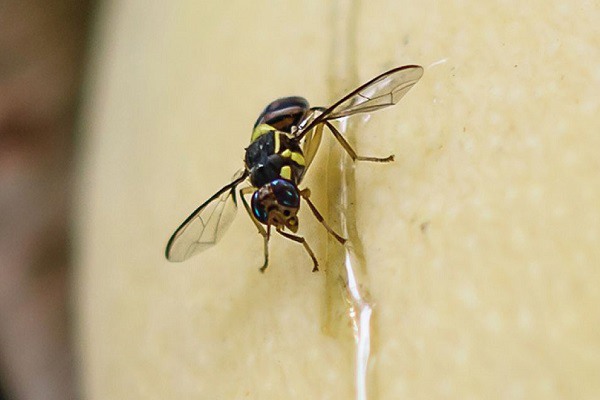In a note published on March 28th, the French food, environmental and occupational health safety agency (ANSES) warned of a risk of long-term establishment of Asian fruit flies in France. The agency recommends increased surveillance, as "the number of flies caught by traps set up as part of official surveillance has increased significantly in recent years."
"Bactrocera dorsalis, or Asian fruit fly, is one of the most damaging pests for many fruit and vegetable crops (mangos, citrus, peaches, plums, apricots, grapes, avocados, tomatoes...). In total, more than 500 species of host plants have been listed)," according to ANSES, which considers "that the probability of long-term establishment of the fly in mainland France is not negligible." The organization therefore recommends "stepping up the surveillance of imported goods and crops in Mediterranean areas near ports and airports, beyond the current regulations."
 Despite regulations already in place to prevent this species from entering Europe, several outbreaks of infestation have been reported in Italy. In France, the Asian fruit fly is the subject of a National Emergency Health Intervention Plan (PNISU)/©Anses
Despite regulations already in place to prevent this species from entering Europe, several outbreaks of infestation have been reported in Italy. In France, the Asian fruit fly is the subject of a National Emergency Health Intervention Plan (PNISU)/©Anses
High probability of Asian fruit fly entering France
The most likely route of entry for Asian fruit flies into France is through commercial imports of fruit and vegetables from infested countries. A classification of these fruits and vegetables has been drawn up according to their import volumes from infested countries, their capacity to carry fly larvae, and data from fly interceptions on fruit and vegetables at French border control posts. Mangos, passion fruits, avocados and guavas present a high risk and have already been intercepted."
Tighter controls on imported fruit and vegetables to prevent entry
ANSES recommends "stepping up inspections on the most at-risk goods, especially if they are not covered by mandatory controls under current regulations, such as passion fruits and avocados. The agency also reiterates the need for strict compliance with the requirements laid down for fruit imported from countries infested with the Asian fruit fly, such as mangos, in order to secure the quality of the merchandise."
Moderate probability of long-term establishment in the low-altitude Mediterranean belt, including Corsica
"The probability of establishment of the Asian fruit fly in mainland France depends mainly on the richness of the host plant species, especially for fruit production in the Mediterranean regions (PACA, Occitania and Corsica) and the Nouvelle-Aquitaine region. In terms of climate, the low-altitude Mediterranean belt, including Corsica, is the only area potentially favorable to the long-term establishment of Asian fruit flies in France."
For more information:
anses.fr
